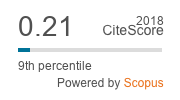Self-Regulation for Reading Comprehension
Assessment of Strategies and Time Management
DOI:
https://doi.org/10.1590/0102.3772e39307.enPalabras clave:
Self-management, Study habits, Reading, Middle school, Psychological assessmentResumen
Self-regulation of learning strategies and time management can foster reading comprehension. This research investigated the content validity of three scales aimed at Middle School students: the Reading Strategies (EE-CL), the Time Planning and Organization (EOT-L), and the Procrastination (EP-L). Three researchers and 16 students evaluated the scales. The theoretical and practical relevance of the EE-CL and EOT-L was verified, but not of the EP-L, whose remaining items were included in the EOT-L. In the internal structure investigation (N= 522 students), the EE-CL presented a unifactorial structure and the EOT-L, two factors, with reasonable reliability estimates. Both scales may help identify specific problems of students' self-regulation aimed at strategies and time management for reading comprehension and support further research.
Descargas
Citas
American Educational Research Association, American Psychological Association, & National Council on Measurement in Education (2014). Standards for educational and psychological testing American Educational Research Association.
Brennan, R. L., & Prediger, D. J. (1981). Coefficient kappa: Some uses, misuses, and alternatives.Educational and Psychological Measurement,41(3), 687-699. https://doi.org/10.1177/001316448104100307
Borsa, J. C., & Seize, M. M. (2017). Construção e adaptação de instrumentos psicológicos: caminhos possíveis. Em B. F. Damásio & J. C. Borsa (Orgs.). Manual de desenvolvimento de instrumentos psicológicos, (pp. 15-38). Vetor Editora.
Carvalho, L. F., & Ambiel, R. A. M. (2017). Construção de instrumentos psicológicos. Em B. F. Damásio & J. C. Borsa (Orgs.). Manual de desenvolvimento de instrumentos psicológicos, (pp. 39-56). Vetor Editora.
Damásio, B. F. & Dutra, D. F. (2017). Análise fatorial exploratória: um tutorial com o software Factor. Em B. F. Damásio & J. C. Borsa (Orgs.). Manual de desenvolvimento de instrumentos psicológicos, (pp. 241-266). Vetor Editora.
Denton, C. A., Wolters, C. A., York, M. J., Swanson, E., Kulesz, P. A., & Francis, D. J. (2015). Adolescents’ use of reading comprehension strategies: Differences related to reading proficiency, grade level, and gender.Learning and Individual Differences,37, 81-95. https://doi.org/10.1016/j.lindif.2014.11.016
Ferraz, A. S. (2022). Autorregulação para a compreensão de leitura no ensino fundamental II: Proposta de avaliação a intervenção (Doctoral Thesis in Psychology). Universidade São Francisco. chrome-extension://efaidnbmnnnibpcajpcglclefindmkaj/https://www.usf.edu.br/galeria/getImage/427/2810491657915438.pdf
Gilakjani, A. P., & Sabouri, N. B. (2016). How can students improve their reading comprehension skill.Journal of Studies in Education, 6(2), 229-240. http://dx.doi.org/10.5296/jse.v6i2.9201
Hernández-Nieto, R. A. (2002). Contributions to Statistical Analysis BookSurge Publishing.
Kintsch, W., & Rawson, K. A. (2013). Compreensão. In M. J. Snowling, & C. Hulme (Orgs.). A ciência da leitura, (pp. 227-244). Editora Penso: Porto Alegre.
Lenggono, B., & Tentama, F. (2020). Construction measurement of academic procrastination of eleventh grade high school students in Sukoharjo. International Journal of Scientific and Technology Research, 9(01), 454-459. http://eprints.uad.ac.id/id/eprint/20077
Leopold, C., & Leutner, D. (2015). Improving students’ science text comprehension through metacognitive self-regulation when applying learning strategies.Metacognition and Learning,10(3), 313-346. https://doi.org/10.1007/s11409-014-9130-2
Lorenzo-Seva, U., & Ferrando, P. J. (2020). Factor Analysis. Recuperado de https://psico.fcep.urv.cat/utilitats/factor/
Marôco, J. (2014).Análise de equações estruturais: Fundamentos teóricos, software & aplicações ReportNumber.
Ministério da Educação, Brasil (2017). Base Nacional Comum Curricular Retrieved from http://basenacionalcomum.mec.gov.br/images/BNCC_publicacao.pdf
Ministério da Educação, Brasil(2018). Prova Brasil: Apresentação Retrieved from http://portal.mec.gov.br/prova-brasil
Muthén, L. K., & Muthén, B. O. (2012). Mplus User’s Guide: Statistical Analysis with Latent Variables (7th ed.). Muthén & Muthén.
Peterson, R. A., & Kim, Y. (2013). On the relationship between coefficient alpha and composite reliability. Journal of Applied Psychology, 98(1), 194-198.
Pinto, N. S., Martínez, A. I. M., & Jiménez-Taracido, L. (2015). Estrategias de aprendizage, comprensión lectora y rendimiento académico en Educación secundaria, Psicologia Escolar e Educacional, 20(3), 447-456. http://dx.doi.org/10.1590/2175-3539/2015/02031011
Schunk, D. H., & Usher, E. L. (2013). Barry J. Zimmerman’s theory of self-regulated learning. In H., Bembenutty, A., Kitsantas, & T. J., Cleary (Eds.). Applications of self-regulated learning across diverse disciplines: A tribute to Barry J. Zimmerman, (pp. 1-28). Information Age Publishing.
Toland, M. D., & Usher, E. L. (2016). Assessing mathematics self-efficacy: How many categories do we really need?. The Journal of Early Adolescence, 36(7), 932-960. https://doi.org/10.1177/0272431615588952
White, M. C., & DiBenedetto, M. K. (2015). Self-regulation and the Common Core: Application to Ela Standards Routledge.
Wigfield, A., Klauda, S. L., & Cambria, J. (2015). Influences on the development of academic self-regulatory processes. Em M. C. White, & M. K.DiBenedetto (Orgs.). Self-regulation and the Common Core: Application to Ela Standards, (pp. 33-48). Routledge.
Xu, Z. (2016). Just do it! Reducing academic procrastination of secondary students.Intervention in School and Clinic,51(4), 212-219. https://doi.org/10.1177/1053451215589178
Zacks, S., & Hen, M. (2018). Academic interventions for academic procrastination: A review of the literature.Journal of Prevention & Intervention in the Community,46(2), 117-130. https://doi.org/10.1080/10852352.2016.1198154
Ziegler, N., & Opdenakker, M. C. (2018). The development of academic procrastination in first-year secondary education students: The link with metacognitive self-regulation, self-efficacy, and effort regulation.Learning and Individual Differences,64, 71-82. https://doi.org/10.1016/j.lindif.2018.04.009
Zimmerman, B. J., & Risemberg, R. (1997). Self-Regulatory Dimensions of Academic Learning and Motivation. In G. D. Phye (Ed). Handbook of Academic Learning, 105-125. Academic Press. https://doi.org/10.1016/b978-012554255-5/50005-3
Descargas
Publicado
Cómo citar
Número
Sección
Licencia
Derechos de autor 2023 Adriana Satico Ferraz, Acácia Aparecida Angeli dos Santos, Ana Paula Porto Noronha

Esta obra está bajo una licencia internacional Creative Commons Atribución 4.0.



